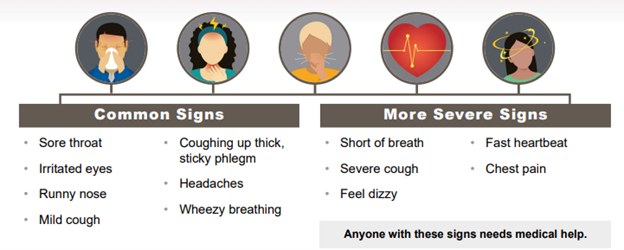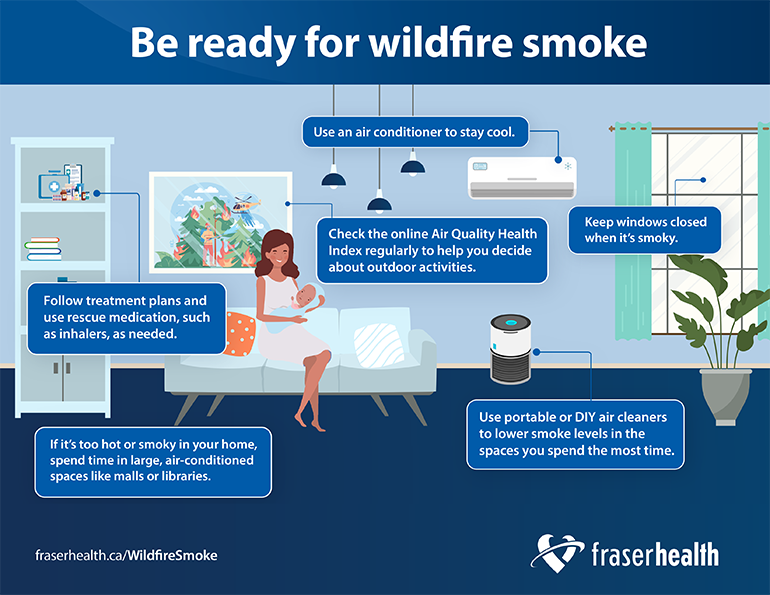Information on wildfire smoke
Wildfires are becoming more common and severe as our climate changes. Fires near and far can blanket our communities with smoke. Breathing in wildfire smoke can affect everyone’s health. The smoky season typically lasts from summer to fall but can start earlier or last longer depending on the year. Take action before and during the smoky season to protect you and your family’s health.
-
Health effects of wildfire smoke
Breathing in wildfire smoke can affect our lungs, heart and other organ systems. Some signs and symptoms are:

Some people may be especially vulnerable to wildfire smoke, including:
- People with lung and heart conditions, including asthma and chronic obstructive pulmonary disease (COPD).
- People with other chronic conditions, such as diabetes.
- Pregnant people.
- Infants and young children.
- Older adults.
- People working outdoors.
- Unhoused and under-housed people.
Learn more about the health effects of wildfire smoke from this factsheet by the BC Center for Disease Control.
-
How to prepare for wildfire smoke
- Talk to a health care provider to understand how smoke may affect you and your family.
- If you or little ones have asthma, have an up-to-date asthma action plan (for adults and children).
- If you use rescue medication (such as inhalers), have a supply ready before the wildfire smoke season.
- Prepare to have clean and cool air in your home:
- See this postcard and poster to learn more about how to protect yourself and your little ones from wildfire smoke.

- Buy portable air cleaners or make effective do-it-yourself (DIY) air cleaners. Use these in spaces where you spend the most time.
- Look into ways to keep your home cool. This can include buying a portable air conditioner, installing a heat pump or getting materials to cover windows to block heat. Find out more on our Fraser Health heat page.
- See this postcard and poster to learn more about how to protect yourself and your little ones from wildfire smoke.
- Before the summer, find air-conditioned spaces in your community that you can spend time in if your home is too smoky or hot. These spaces can include shopping malls, libraries, community centres and faith-based centres.
- Be aware of the air quality:
- Sign up to receive information on air quality advisories and alerts. If you live in the Metro Vancouver region, sign up for the Metro Vancouver mailing list. If you live in other parts of BC, sign up for the Air Quality Subscription Service.
- Learn about the Air Quality Health Index. It gives air quality ratings for communities and provides messages to help people make decisions about outdoor activities
- Download the BC Wildfire Service app. This app from the BC Wildfire Service provides up-to-date wildfire information.
- Learn how to make a DIY air cleaner with Dr. Newhouse, medical health officer at Fraser Health:
-
What to do when it is smoky
- Monitor the air quality
- Check the Air Quality Health Index (AQHI) often. It gives air quality ratings for communities and provides messages that can help you make decisions about outdoor activities.
- Check the air quality from regulatory and non-regulatory low-cost sensors in your area at the BC AQ Map.
- Check the wildfire smoke forecast for your region on firesmoke.ca.
- Spend time in clean and cool air spaces at home or in your community.
- At home, use portable air cleaners or DIY air cleaners in spaces where you spend the most time.
- Keep your home cool using tips on this Fraser Health heat page.
- If your home is too smoky or hot, spend time in air-conditioned community spaces, such as libraries, community centres and faith-based centres.
- Check with your local government to see if there are any cooling and cleaner air spaces near you.
- Follow your treatment plans and use rescue medication, such as inhalers, as needed.
- Pay attention to how you feel. Even at lower levels smoke can affect your health. If you are bothered by smoke, stop or reschedule outdoor activities, move to cleaner indoor air and seek medical care when needed.
- Drink plenty of water.
- If you work outside, consider wearing a high efficiency mask such as those marked as N95, KN95 and KF94. Masks must fit well to provide any protection. This factsheet gives more information on masks.
- If you feel anxious and stressed, you can access resources to support your mental health, including HeretoHelp, the First Nations and Indigenous Crisis Line Society and BC Children's Hospital.
- Monitor the air quality
-
Find resources
Explore these resources to find out more about wildfire smoke and actions you can take:
- Wildfire Smoke Poster
This poster from Fraser Health and Vancouver Coastal Health summarizes health effects of wildfire smoke. Available in multiple languages: English | Arabic | Chinese - simplified | Chinese - traditional | Hindi | Korean | Farsi | Punjabi | Spanish | Urdu | Vietnamese - Wildfire Smoke Factsheets
This factsheet series from the BC Centre for Disease Control gives information on topics such as how to choose air cleaners, how to make DIY air cleaners, health impacts of wildfire smoke during pregnancy, and outdoor exercise when it is smoky. Some factsheets are available in multiple languages. - Extreme heat and wildfire smoke events, outdoor public gatherings and protecting health
This guide from Fraser Health and Vancouver Coastal Health provides practical information on protecting people from heat and wildfire smoke at outdoor public gatherings. - Wildfire smoke: Schools and child care facilities
Learn how wildfire smoke can impact indoor air quality and actions to take before and during the smoke season to reduce its impact on and health. - Ventilation and indoor air quality: Schools and child care facilities
Learn how ventilation affects indoor air quality and ways to improve it. - Traffic-related air pollution: Learn how traffic-related air pollution can impact indoor air quality and health and ways to reduce its impact.
- Guidance for Cleaner Air Spaces during Wildfire Smoke Events
This document from Health Canada provides guidance to local governments and organizations on setting up cleaner air spaces, including recommendations for filtering indoor air and air quality monitoring. - Wildfire Smoke: Frequently Asked Questions
This resource from WorkSafeBC provides guidance to people working outdoors. - Health and safety resources for wildfire season
This webpage from WorkSafeBC provides information to employers on measures to protect workers working outdoors and indoors during the wildfire season.
- Wildfire Smoke Poster
